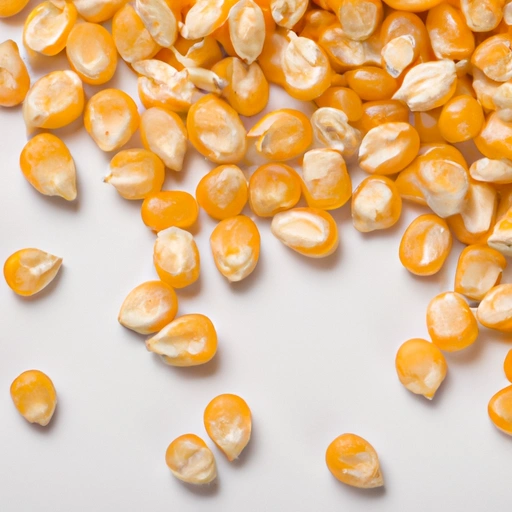Corn Kernel
Description

Corn kernels are the individual seeds that come from the cob of a corn plant, also known as maize. Recognized for their sweet, mild flavor and satisfying crunch, corn kernels are a staple food in many cultures. Available in fresh, frozen, canned, and dried forms, this versatile ingredient can be used in a myriad of dishes, both savory and sweet. Corn kernels can be measured in various units, including cups (US), grams (metric), and ounces (Imperial/American).
Common uses
Corn kernels are commonly used as a side dish, in salads, soups, stews, and casseroles. They are also popular in the production of cornmeal and corn flour, which are used to make bread, tortillas, and polenta. Snack foods such as popcorn and corn chips also rely heavily on corn kernels as their primary ingredient.
Nutritional value
Calories
A 100-gram serving of corn kernels contains approximately 86 calories (360 kJ).
Protein
That same serving size has about 3.2 grams of protein.
Fat
Corn kernels have a low fat content, with around 1.2 grams of fat per 100 grams.
Carbohydrates
Carbohydrates are abundant in corn kernels, tallying about 18.7 grams per 100 grams.
Vitamins
Corn is a good source of B vitamins, particularly thiamin (B1) and niacin (B3), and also contains vitamin C.
Minerals
Important minerals found in corn kernels include phosphorus, magnesium, and potassium, as well as trace amounts of iron and zinc.
Health benefits
Consuming corn kernels can contribute to overall health thanks to their fiber content, which aids in digestion. The presence of antioxidants such as ferulic acid may help combat free radicals, and the B vitamins support energy metabolism and nervous system health.
Potential risks
While corn kernels are generally safe to eat, they can be problematic for people with corn allergies. Additionally, some corn may be genetically modified or treated with pesticides, so those concerned may opt for organic varieties. Overconsumption of high-calorie corn-based snacks can lead to weight gain.
Common recipes
Corn kernels are featured in a wide range of recipes, from the American classic cornbread to the Mexican staple, tamales. They're also used in European dishes such as Italian polenta and the French corn soufflé.
Cooking methods
Corn kernels can be boiled, steamed, sautéed, grilled, roasted, and even microwaved. They are versatile and can be cooked with or without their natural moisture.
Pairing with other ingredients
Corn kernels pair well with a variety of ingredients including bell peppers, onions, tomatoes, black beans, cheese, and herbs like basil, cilantro, and parsley. They also complement proteins such as chicken, pork, and seafood.
Summary
Corn kernels are a nutritious and adaptable food ingredient that can be incorporated into a wide variety of dishes worldwide. With a rich history and a range of uses from side dishes to main courses, corn kernels are a cherished part of global cuisine.